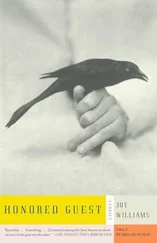“I know butter doesn’t do it, but it’s all that was here.” She moved placidly, curiously out of step with her pain. She put the ironing board back in the closet and went down on her hands and knees to rub at the blackened spot on the floor. She had been dressed up. A gray suit with a little velvet collar, a silk scarf around her throat, a gay hat fastened to her hair with pins. But her hair was combed queerly, slicked down forward and flat, ending in greasy rolls. The zipper on her skirt was broken. Her nylons were torn.
She rubbed at the floor, chiding herself gently. “How silly of me. How ridiculous. I was just pressing a few things. That basket is just full of things. The lid can’t even fit. And they go back for years and years.” She patted the floor one final time in commiseration. “The ones on the very bottom look like doll clothes. Little gowns. Tiny slips. I didn’t want to move them for fear they’d break, but on top of them all the other things, in strata, you know, in histories. I had forgotten them and they’re still quite good. If I just put them in order again I’m sure there’s life in them still.” She rose awkwardly. She still held the butter in one fist. It rose grayly with her, accompanied her as she moved to the big wicker hamper.
The iron had cut into the corner of her mouth as well. A few days later it would be black — a slim, fried shoestring of fat. “I used to imagine Kate and I doing little things together,” she said abruptly, “you know, gardening, making cookies, Christmas candies. No, no,” she said, although no one had interrupted her, “I had always wanted her to be happy. And kind. I wanted us to do little things together. Like in the stories.”
“What stories?” the Reverend had asked, and his voice had been melancholy, surprisingly mild, gently respectful. His back was to her and to Kate as well. The night had been very still. They had heard the rocks rolling in the surf below, clopping like horses’ hoofs. The child had crept to the stairs, had waited on the third step. She decided to run through one of her Bible quizzes. Thinking of puzzles, the Reverend had told her, is always permissible.
A was a monarch who reigned in the East
B was a Chaldee who made a great feast C was veracious when others told lies
D was a woman heroic and wise
“The stories,” crooned the woman’s voice. “But that wasn’t her way, was it? Now her sister. Her sister used to say on a bright sunny day, she would smile up at me and say, ‘Mommy, what a good drying day!’ ” There had been silence. The child moved up another three steps.
V was a castoff and never restored
Z was a ruin with sorrow deplored.
“I was ironing,” the woman had said, “and my cheek itched. I forgot I was holding the iron. I reached up to scratch it. How else could such a thing have happened?”
The child had gone back to bed.
THE DAMAGED TILE had been replaced. There was a box of extra ones in the barn. It was brighter than the surrounding ones, but the pattern was the same. From then until the night she died, nothing of the sort had been repeated. She had stayed exclusively in the room upstairs. Nothing was done in the house except what they, the father and the child, did. Nothing was said except by them. The woman took no further interest in the household.
“We mustn’t expect too much from your mother any more,” the Reverend had told the child. “We mustn’t tire her or question what she’s doing. Think of the changes in her body, Kate. Hormones and the will of God. That’s our life, Kate.”
The child had played in the hallway, outside the woman’s unpleasant room. She would play absorbedly for a while and then announce, “Mother, I won.” And then she would say calmly, for the truth of it had never troubled her, “It doesn’t mean anything because I’m the only one playing.”
The woman had not replied. Her mind had long since stopped on the blank threshold of that door. Her mind no longer dealt with the child. It was over, over, in the past. But where before had been this loneliness? When the exile? Why had mere words corrupted her instinct for love?
The child had played in the hallway. An only child, amusing herself — her head full of fantastic things. When her dog plodded up the stairs and stepped across her, intent on visitation, functioning in some gentle memory of a contented time, the child had reproved him severely. “No, no, Race, don’t go in there.” Of course it had been just a child’s frivolity, but the woman had not replied. Deep in her musing, she had carried on in her singular fashion. Her time had been divided into three parts, like a banal clover. There had been the smoothing of the bed, the idleness at the window and last and basically, the devout involvement with her burgeoning self. For daily, the child had seen her, tending to her body, cleaning it, carefully sounding and examining it. She gave her limbs brisk slaps and pinches, moved her trembling hands and mouth over her skin, scouring herself like a bird. She had become her own physician, her own lover. The child had watched the foaming tub of her belly shiver, had watched the woman’s hands become delicate, swift, precise. The child had watched, unstartled. Always it had been the same. The difference was only in degree. The woman had traveled miles in that room. Centuries. Reaching her debacle, she had also attained herself.
Her face had been on the way to healing itself, in its own manner. The injured part glowed dusky under the sliding white cast of the sun. Like a map. Like the state of … Virginia. The child had lingered on the doorsill, tracing out astonishing creatures for play. The only thing that could kill a skoffin, she was sure she had heard her father say, was the sight of another skoffin. The woman had given little cries. Her shanks were skinny, her shoulders gaunt. Her mouth had opened into a crooked O. Her teeth lay across it like tiny fishes waiting to be hatched. The child had heard of this. Fishes born in their mothers’ mouths, fleeing back there when in danger. The woman’s mouth had closed with a moist sea sound. She had writhed briefly, she had straightened. Like a thick weed floating in the valley of the surf, her stomach plump and vulnerable as a seaweed’s pod. The child had often thought at that point, for there had always been that point in the day at the edge of her mother’s room, just before she, the child, would leave, the child had often thought that if she crept into the room, softly, so that the woman would not become aware of it, like an Indian, like a thief, clever and soundless as a hawk or a shark, that if she slipped into the room and embraced her, lightly, lightly and unbeknownst to the woman, if she encircled her waist with her own small arms as best she could and squeezed suddenly and very hard, the swollen stomach would pop like a blister of bladder wrack, it would crack like the grim Atlantic and all would be delivered and dispelled. The baby would rush to the floor in a flood. There would be a briny, shiny smell, and then the ceiling of the room and then the roof of the house would topple away leaving in the dull day, and then the winter sun, with its evaporating qualities, with its own mysteries, would drink up every drop.
But the child never entered the room. Not even cleverly. Not even in stealth. She went outside. She skated a little. She returned, she asked her father for a candy. The woman and the room were forgotten for a while. After all, what could be done? She was a prisoner in waiting, and quite mad.
THE LONG BLUE LIPS, the wave of what had been, draw back. The child is at the bottom of the stairs. There is no one in the room any more. She has no mother. She is in a house of mourners. They are all eating but someone comes out of their number and she feels her coat being taken off. She sits down and her boots are unbuckled and then they are gone too. She has loafers on, a white penny in each one. An older girl in school had approached her one recess. A penny means you’re single and you’re looking, the girl had said. And a white penny means you’re a poor dope because they’re from Canada and not worth a thing.
Читать дальше












